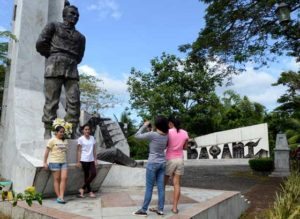THE MILITANT Bayan Muna party-list group will again seek the recognition of Andres Bonifacio as the first president of the Philippines, as well as declare him a national hero, in a move that will likely stoke debate among historians.
In a statement on the eve of National Heroes’ Day, Bayan Muna Rep. Carlos Zarate said due recognition and respect should be given to “real” heroes like Bonifacio, who is regarded by militants as a peasant, anti-colonial hero who led the revolution against Spain in August 1896.
“We must also be very wary of those who claim they are heroes like Emilio Aguinaldo and Ferdinand Marcos who were only looking out for their vested interests,” Zarate said.
No law has been enacted proclaiming an official national hero, Zarate said.
In 1993, a National Heroes Committee was formed by Executive Order No. 75. After careful study, a technical committee recommended in 1995 nine historical figures as national heroes, namely: Jose Rizal, Andres Bonifacio, Emilio Aguinaldo, Apolinario Mabini, Marcelo H. del Pilar, Sultan Dipatuan Kudarat, Juan Luna, Melchora Aquino, and Gabriela Silang.
Bonifacio, known as the Great Plebeian, founded and led the revolutionary secret society Katipunan against Spanish rule in 1892.
National Heroes’ Day is celebrated on the last Monday of August to mark the “cry” and the tearing of cedulas or residence certificates by Katipuneros in August 1896 that signaled the start of the revolution against Spain.
A number of historians argue that Bonifacio can be regarded as the first president because the Katipunan was a national government.
Zarate cited historians such as Milagros Guerrero, Emmanuel Encarnacion and Ramon Villegas, who wrote that Bonifacio founded the country’s first national government and served as its president on August 24, 1896.
The 2003 edition of the book titled “Andres Bonifacio and the 1896 Revolution” by Guerrero, Encarnacion and Villegas states that the Katipunan National Assembly convened on August 24, 1896 and declared an armed revolution against Spain, established a national government, and elected officials.
“It was this government headed by Bonifacio that organized and declared the nationwide armed revolution against Spain in the Cry of Pugadlawin on August 29, 1896 and is the cause of today’s holiday. It is but right and just to recognize the Gat Andres Bonifacio as the hero president who led and died for the Philippines,” Zarate said.
According to the Official Gazette, the country’s official government journal, no hero is named by law in connection with the celebration of National Heroes’ Day.
“And this lack of specifics offers an opportunity to celebrate the bravery of not one, not a few, but all Filipino heroes who have braved death or persecution for home, nation, justice, and freedom,” said the Official Gazette.
Tagalog Republic
Almost two years ago, the Enzo Williams movie Bonifacio: Ang Unang Pangulo was released in cinemas, espousing the arguments for declaring Bonifacio as the first president, with action star Robin Padilla playing the lead role.
De La Salle University historian Xiao Chua petitioned on change.org to acknowledge Bonifacio as the first president.
“The Bonifacio for First President petition only aims to prove an existence of a government of a national character before General Emilio Aguinaldo. It will not take any honor already bestowed on Aguinaldo as President of the First Constitutional Democratic Republic in Asia and Father of Philippine Independence. His place is already secured,” Chua stated on the petition.
The petition has garnered 6,977 supporters online.
Chua’s petition is backed up by documents from the Archivo General de Madrid showing that the Katipunan had a centralized working government.
Guerrero, Encarnacion and Villegas filed a petition before the National Historical Institute (NHI) in 1993 to acknowledge Bonifacio as the first president of the country, instead of Aguinaldo.
On July 7, 1994, the NHI rejected the petition, pointing out that Bonifacio was not even the first Supremo of the Katipunan, but Deodato Arellano.
In 2013, a resolution was proposed by the Manila City Council urging the national government to recognize Bonifacio as the first president of the Tagalog Republic, with the word “Tagalog” used in the Katipunan’s cartilla referring to all natives of the Philippine archipelago.
Marlon Cadiz of the National Historical Commission of the Philippines (NHCP) told The Manila Times the agency has yet to receive a full-blown study on the matter.
“The presidency of Aguinaldo is still recognized over that of Bonifacio. There is still no clear study submitted to the NHCP containing new evidence and explanations of experts establishing that Bonifacio was the first president,” he said.



